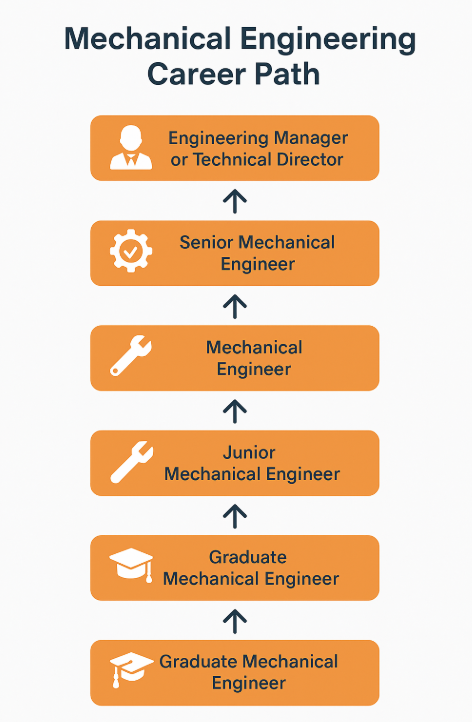Whether you’re a newly qualified graduate or a mid-career professional eyeing the next step, understanding your mechanical engineering career path is essential for growth.
In this guide, we explore what a typical journey looks like from entry-level to senior roles, the skills and certifications you’ll need at each stage, and how to accelerate your progression with strategic decisions.
A senior engineer provides technical leadership, mentors junior staff, and influences design strategy. You’re the go-to expert in your domain.
Career Stages in Mechanical Engineering
Below is a visual representation of the typical mechanical engineering career path:

1. Graduate Mechanical Engineer (0–2 years)
Overview:
This is your entry point. Most graduates start here after earning a BEng or MEng in Mechanical Engineering. You’ll gain exposure to projects under supervision and begin learning the practical applications of your academic knowledge.
Key Responsibilities:
- Assisting in design and development work
- Using CAD software under guidance
- Supporting project planning and documentation
- Learning compliance standards (e.g. ISO, ASME)
Required Skills:
- Basic proficiency in AutoCAD, SolidWorks, or similar
- Analytical thinking
- Strong communication and willingness to learn
Certifications to Consider:
- Fundamentals of Engineering (FE) or equivalent
- CPD courses in safety, manufacturing, or systems engineering
2. Junior Mechanical Engineer (2–4 years)
Overview:
During this period, you begin to take on more responsibility and are expected to operate more independently. You might lead small tasks within larger projects.
Key Responsibilities:
- Designing components and systems
- Running simulations and analyses
- Liaising with cross-functional teams
- Contributing to cost estimates and scheduling
Skills to Develop:
- FEA/CFD analysis tools (e.g., ANSYS)
- Time management and multi-project handling
- Technical writing and documentation
3. Mechanical Engineer (4–7 years)
Overview:
Now operating as a fully competent engineer, you’re likely to manage full project elements or small projects. You may supervise graduates and juniors.
Key Responsibilities:
- Project ownership (from concept to delivery)
- Managing suppliers and production teams
- Ensuring regulatory compliance and risk assessment
- Cost-saving initiatives and process improvements
Career Tip:
At this stage, it’s crucial to decide whether you’re on a technical or managerial track. Both can lead to senior roles, but may involve different development paths.
4. Senior Mechanical Engineer (7–10+ years)
Overview:
A senior engineer provides technical leadership, mentors junior staff, and influences design strategy. You’re the go-to expert in your domain.
Key Responsibilities:
- Leading engineering teams or major workstreams
- Budgeting and high-level planning
- Client engagement and presenting technical concepts
- Driving innovation and continuous improvement
Desired Skills:
- Leadership and mentoring
- Strategic decision-making
- Advanced simulation/modelling knowledge
- Stakeholder communication
Recommended Certifications:
- Chartered Engineer status (CEng) through IMechE or Engineers Ireland
- Project Management Professional (PMP) or Prince2
- Lean Six Sigma (Green/Black Belt)
5. Principal Engineer / Lead Engineer / Technical Expert
Overview:
These roles typically blend deep technical expertise with leadership. You may be the subject matter expert in product development, R&D, or manufacturing systems.
Key Characteristics:
- Recognised expert in a specific niche
- Responsible for technical standards across multiple projects
- Guides strategic planning at senior levels
- May operate globally or across business units
6. Engineering Manager / Technical Director
Overview:
In this final stage, you’re part of the decision-making core of the organisation. You oversee multiple teams and projects, and influence the company’s direction.
Key Responsibilities:
- Departmental leadership
- Hiring, budgeting, and high-level risk management
- Driving innovation, culture, and long-term goals
- Client and stakeholder negotiation at an executive level
How to Accelerate Your Career Progression
Here are practical steps to move from one stage to the next:
1. Continuous Professional Development (CPD)
Engage in CPD activities to stay ahead of industry trends and new technologies.
2. Networking
Join professional bodies like Engineers Ireland or IMechE. Attend webinars, conferences, and local chapter events.
3. Work with a Specialist Recruitment Agency
Agencies like PE Global can offer career coaching, help match you to ideal roles, and provide insight into what employers are currently seeking.
4. Keep Your CV and LinkedIn Updated
Showcase new skills, achievements, and qualifications. Demonstrate progression and adaptability.
Industry Insights: What Employers Are Looking For
Recruiters and employers in mechanical engineering currently value:
- Experience with sustainable design and energy-efficient systems
- Proficiency with modern simulation and design software
- Project leadership and stakeholder management skills
- Industry-specific experience (e.g. pharma, energy, manufacturing)
At PE Global, we specialise in helping mechanical engineers advance their careers with access to roles in leading global companies across Ireland, the UK, and beyond.
Conclusion
The mechanical engineering career path is both structured and flexible. By understanding what’s expected at each stage and actively seeking ways to upskill, you’ll be better placed to climb the ladder, whether your goal is technical mastery or a leadership role.
Finally, let PE Global help you find your next step. Explore our current Mechanical Engineering roles or upload your CV to get started.
